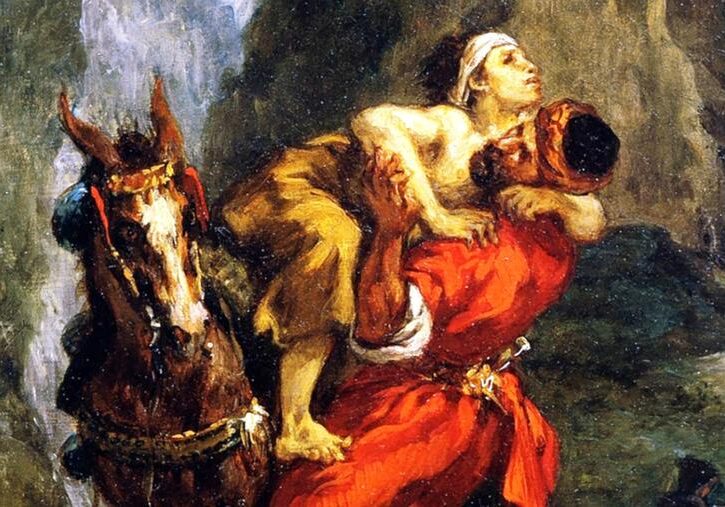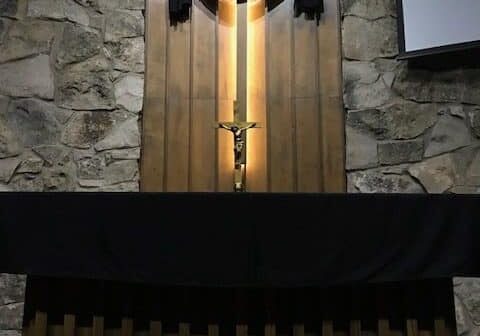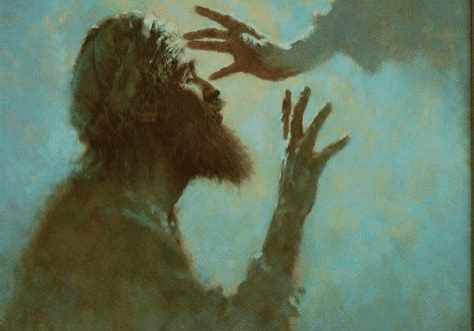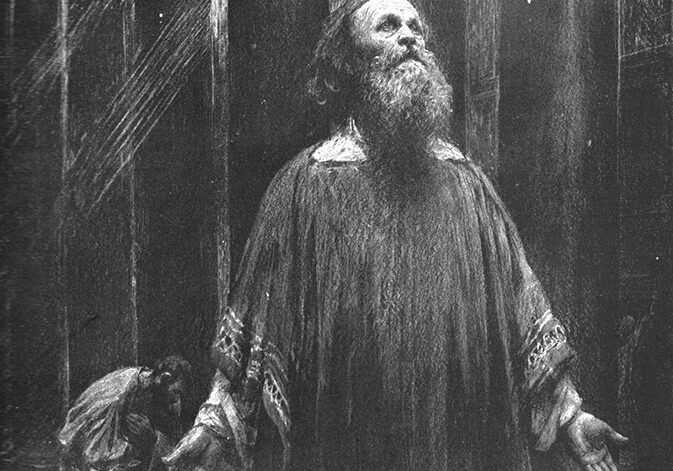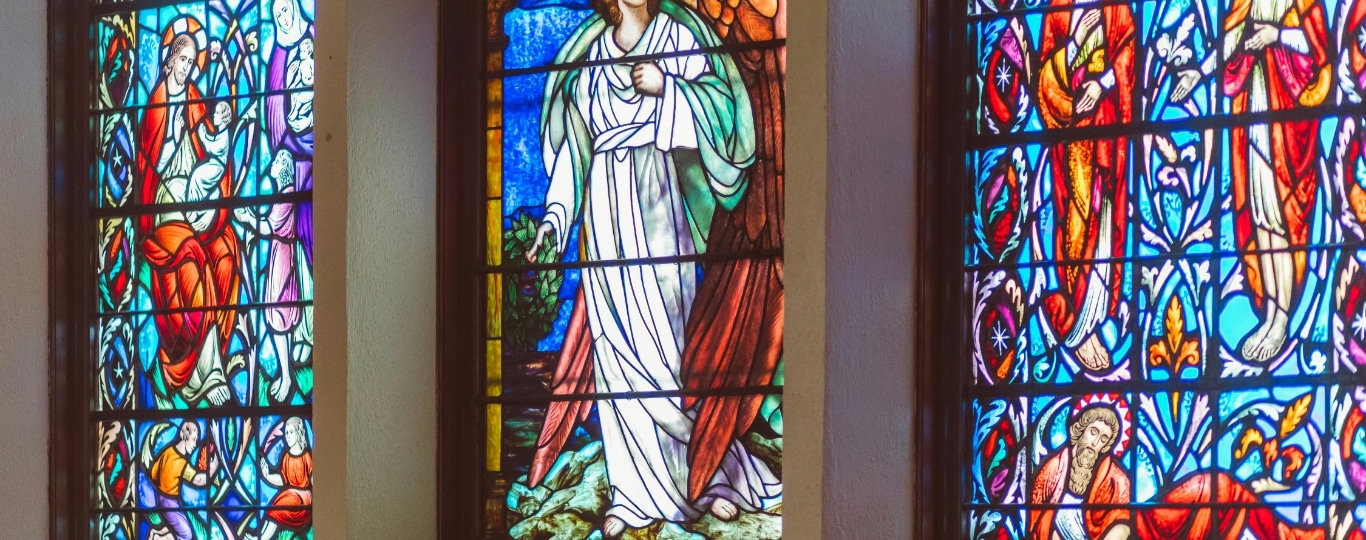†
In our Epistle Lesson for today’s Eucharistic Feast, St. Paul recapitulates or ‘goes over the main points again’, the purposes of JESUS’ institution of the blessed Holy Eucharist. He does this for the members of the Church in first century Corinth, who seem to have lost their understanding of their great calling, which they show in their approach and participation in the LORD’s Supper. He says, “For as often as ye eat this bread and drink this cup, ye do shew the LORD’s death till He come” (1 Corinthians 11:26). That is, the Corinthians, as all Christians do, when they come forward as a body of believers, to take the Bread and drink of the Cup, announce Christ’s complete and satisfactory atonement and sacrifice for humanity’s sin, through His death on the Cross. By participating in the LORD’s Supper, we make this confession with authority and conviction. By eating His Body and drinking His Blood, this reflects our participation in the ‘innumerable benefits procured unto us by the same death’, even the death JESUS died on the Cross.
The essence of the Last Supper, as some call it, was to replace the Passover Meal instituted by GOD through Moses. That meal also pertained to the proclamation and participation in a death – the death of an unblemished, spotless, young male lamb. This lamb was sacrificed on the night that the Angel of the LORD passed over Egypt, killing the firstborn sons of all who did not have the blood of this lamb covering the doorposts of their homes. By this action, each family declared their participation, with conviction and authority, in the redemptive work of the sacrificed lamb appointed by GOD.
Israel had been in bondage to Egypt, and the Pharoah refused to let Israel depart from his dark overlordship. The Pharaoh had even tried genocide and concentrated labor to bring Israel into conformity and subjugation to his will. This harsh treatment of the Pharaohs of Egypt had been inflicted upon Israel for over 275 years before Moses came to the Pharaoh’s royal court to seek their release. And amid of their suffering, GOD’s people cried out and GOD heard their cry, saying, “I have surely seen the oppression of My people who are in Egypt, and have heard their cry because of their taskmasters, for I know their sorrows. So, I have come down to deliver them out of the hand of the Egyptians” (Exodus 3:7-8).
Part of the strategy to free the people from Pharaoh’s enslavement, was to have Moses, GOD’s interlocutor, perform acts of wonder causing plagues on the people of Egypt, while sparing the people of Israel from any of their effects. All of this was done as a sign to the people of Israel, and to change the heart of the Pharaoh, who, even with all the plagues having taken their course, refused to let GOD’s people free.
So, after nine plagues of great distress, GOD told Moses that he would enact one final plague, and this would change the Pharaoh’s heart, and he would let Israel go. — The plague that would change Pharaoh’s heart, is the Passover of GOD. — GOD describes the Passover in this way: “About midnight I will go out into the midst of Egypt; and all the firstborn in the land of Egypt shall die, from the firstborn of Pharaoh who sits on his throne, even to the firstborn of the female servant who is behind the handmill, and all the firstborn of the animals. Then there shall be a great cry throughout all the land of Egypt, such as was not like it before, nor shall be like it again. But against none of the children of Israel shall a dog move its tongue, against man or beast, that you may know that the LORD does make a difference between the Egyptians and Israel” (Exodus 11:4-7).
Needless to say, things happened just as the LORD said they would, and Pharaoh requested, nay, demanded that GOD’s people leave Egypt. — Yet, what happened here? — Simply put, GOD judged the people who were in league with Pharoah, GOD’s enemy, because they persecuted GOD’s people. The price of that judgment was death for sin against GOD. — And, the only way to prevent GOD’s wrathful judgment of death for sin, was the blood of an innocent, spotless, young male lamb. Everyone who did not follow the LORD’s command, as given to the people by Moses concerning the lamb would face His judgment. Those who did, would not. That command was to take a lamb of their own flock and sacrifice it, covering their homes, (which was representative of themselves), with its blood. The blood of the innocent lamb would then pay for the price of GOD’s judgment. The price of that judgment was the loss of the firstborn son. This is a way of saying that those that did not follow GOD’s commandment, would be cut off from the earth and the blessings of GOD. Since each family’s name or legacy was bound up in the life of their eldest son, if he were to die, then the family or people would be eradicated from the face of the earth. This was the result of the judgment of GOD in the last plague of the Passover. And the reason for this hash judgment from GOD? It was because the Pharaoh and his people had killed many of GOD’s sons, and would not let his people go. Thus, this was retribution for their enmity with GOD.
Yet, for those who trusted GOD and did what He said, showing themselves the friends of GOD, (Israel and some of the Egyptians), their eldest sons were preserved in the land, and their names were not cut off. That is because the lamb was a substitutionary victim, and its blood payment for the lives of Israel’s eldest sons. These people would be ‘passed over’, as it were, by the Angel of the LORD, and they would be saved. — This event in history, the ethnic Jews of the world still remember, celebrate, and declare every year – and it is called, the Passover. And by this feast, each year, to use St. Paul’s language, the Jews declare the death of the lamb until the Messiah comes to make Israel new. This is their hope!
Now, you know, if you did not before, the parallel between the meaning of the Passover meal and the LORD’s Supper. For Christians, the LORD’s Supper, which JESUS instituted on the night before He was betrayed, tortured, and nailed to a Roman Cross, serves the same purpose as the Jewish Passover – yet, far exceeds it. The LORD’s Supper was instituted, not with the blood of a lamb of creation, but of the Blood of the Lamb of GOD, the Son of the Father of the blessed Holy Trinity. — As the writer of the Letter to the Hebrews has written, for if the blood of an earthly lamb could save those from judgment of sin who had rebelled against GOD in Egypt, “how much more shall the blood of Christ, who through the eternal Spirit offered Himself without spot [or blemish] to GOD, cleanse our conscience from dead works to serve the living GOD” (Hebrews 9:13). — While the blood of the Passover lamb was shed, remembered, and shewed for the saving of the first-born sons of Israel in Egypt, Christ JESUS’ Blood, shed upon the Cross on Good Friday, is remembered and shewed in the Cup of the LORD’s Supper for the remembrance of JESUS’ sacrifice and salvation for all people, of all time, (viz., for those that believe in GOD and call upon His Name for salvation). — The blood of the Passover lamb saved the sons of Abraham and allowed their redemption from the bondage of Pharaoh. The Blood of the Lamb of GOD, JESUS Christ, saves the sons and daughters of the faith of Abraham, and allows for their redemption from the bondage of the devil, sin, and spiritual death.
The point that St. Paul is making in today’s Epistle Lesson, is that all who partake of the LORD’s Cup and the LORD’s Bread, make a pact of solidarity and unity (co-union, in fact), not only with the effect of Christ’s work in shedding His blood to cover for sin, but also the essence or purpose of His Sacrifice. — And what was that? — It was for co-union and not dis-union; co-union with GOD and fellow believers, not dis-union with either GOD or fellow believers. This was the problem of some members in the church in Corinth. Paul said, “For first of all, when you come together as a church, I hear that there are divisions among you, and in part, I believe it. For there must also be factions among you, [of which only some of you approve]” (1 Corinthians 11:18-19).
Though the Corinthian church regularly broke the Bread and drank of the Cup of the LORD’s Supper together, shewing JESUS sacrifice until His coming again, they had begun to drink and eat judgment upon themselves by forsaking the unity of the Body, which is the blessed Company of all Believers. They did this by creating factions and cliques in their church, of which only some were considered worthy of liberation by Christ and loved by the Father. – JESUS Christ gave His life ‘for the sake of the whole world,’ and the Corinthians had made the LORD’s meal, for which they shewed, a meal of separatism – some being included and some being excluded. As St. Paul says, they did ‘not discern the LORD’s Body’, nor the union of its members.
Thus today, dear brothers and sisters of St. Mark the Evangelist, we must contemplate the Holy Sacrifice Christ made on the Cross. This day, above most, recapitulate, or go over the main points again, of the horrors that began in history, for us and our families, at this very time on Maundy Thursday. In today’s Epistle Lesson, St. Paul gives us another token of reflection on the great love and priceless sacrifice of JESUS and why He made it. – Yes, the Paschal Passover that we celebrate for the redemption of the whole world was given by GOD in Christ, for the sake of liberation from sin, and the co-junction or co-union of His followers into one Body – His Body. The Cross was never meant as a means of separation nor distinction of any of those who believe in His Blood and call upon His Name. Instead, “The true understanding of this meal’s fruition and union, which is betwixt the Head and the Body, betwixt the true believers in Christ, was and is … to know the favorable mercies of GOD sealed, the satisfaction by Christ towards us confirmed, the remission of sin established … and the spreading abroad of brotherly kindness, along with many other sundry graces of GOD. The taste whereof no one can attain unto, who be drowned in the deep, dirty lake of blindness, ignorance, selfishness, and elitism.
Let us therefore, dear brothers and sisters of St. Mark’s, wash ourselves with the Living Waters of GOD’s Holy Word, whence we may perceive and know, both the Spiritual Food of this costly supper and the happy trust of things that have affected Communion with GOD and our fellow men in Christ, through it – even the LORD’s Supper.”1 Let it be so now and ever, world without end, to the glory GOD, and unto the edification of His blessed Church – Amen and Amen!
1 Various Anglican Divines, The Anglican Book of Homilies, (London: The Prayer Book and Homily Society, 1852), 417.
Join Us for Biblical Worship, Study, & Fellowship
Sundays:
Morning Prayer 9:45 am
Coffee & Catechesis 10:30 am
Holy Communion 12:00 pm
Thursdays:
Holy Communion 6:00 pm
Recent Sermons
